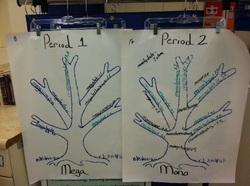 For vocabulary instruction, I am currently using Words Their Way: Sorts for Derivational Spellers. At this stage, students begin looking at Greek/Latin Root Words. In an effort to get students think about vocabulary outside of my 90-minute class I created "Root Word Wars." This is a weekly competition between periods in which students try to bring in the most words that have their period's preassigned root word (see picture). Homework has never been met with such enthusiasm! Steps for the Assignment 1. Find a tree that has blank space for writing on Google images. 2. Blow it up to poster size (parent center at my school does this), or you could draw trees on chart paper. 3. Use hangers (see picture) to hang the posters around the room. 4. Decide on a different root word for each class, but roots that are equally common, so it won't be an unfair competition. 5. Students can bring a maximum of one word daily, this places the emphasis on participation. They should have some idea of the meaning, but have a class discussion and try to figure it out based on the meaning of the root word. 6. At the end of the week (or two depending on the prize) tell students that you will count the words and whichever class brings in the most words wins. The first week we brought milk and doughnuts for the winning period (Final score: 17-8). Next week, I am going to offer them a pizza party, but I am extending the time period to two weeks. 8. Ultimately, the students really enjoyed sharing their words with the class in a public way (I let them do it right after vocabulary instruction). Also, more and more students started doing the homework, and hopefully, thinking about the vocabulary they encounter on a daily basis. Troubleshooting 1. If students claim it is not fair because one class is bigger than another you can make it fair by allowing several (pre-designated) students to bring in two words, so that the maximum amount of words they can bring in is equal. 2. I don't want students to do the assignment in class, so the requirement is that they had to have the word on a piece of scrap paper or pulled up on their phone. This is informal, but it just proves to me that they thought about it before class. Their oral sharing of the word is the important part. 3. Finally, I am a special educator, so I have smaller class sizes 10-15. If you use this in a larger class, please post a comment and let me know how you would adapt it!
0 Comments
|
Archives
November 2023
AuthorMs. Young is a teacher who wants to keep a record of what works! Categories |
 RSS Feed
RSS Feed